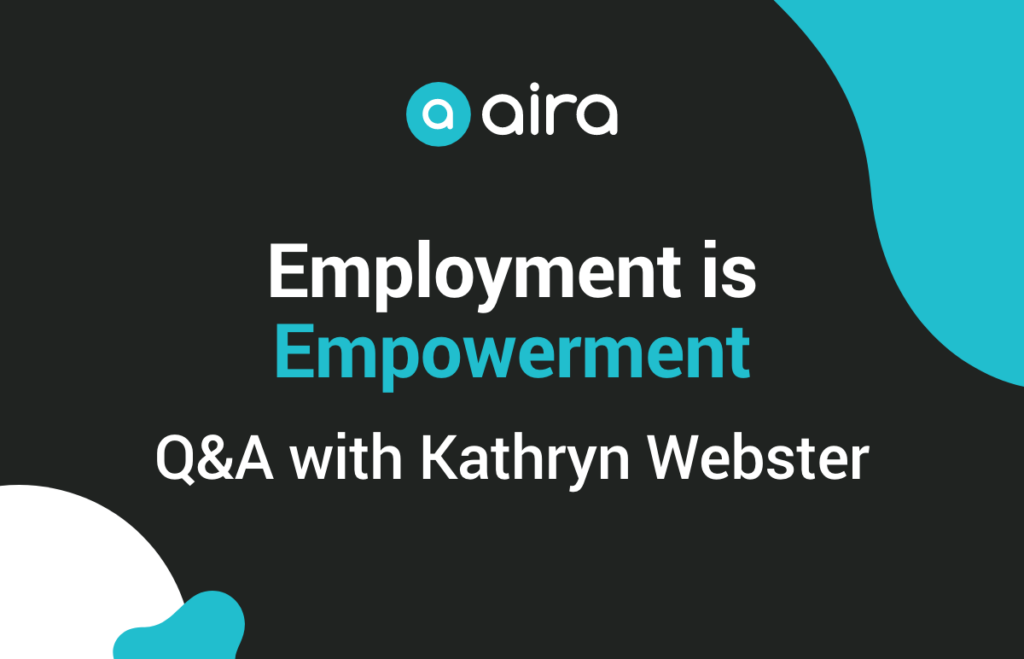
Blind and low vision individuals are woefully underrepresented in the workforce, but even more so when it comes to non blindness fields like business and finance. As an MBA student and management consultant in corporate America, Kathryn Webster is used to being the only blind person in the room – but she’s on a mission to change that.
What does your day-to-day look like?
I’m getting my Master of Business Administration at Harvard Business School (HBS), but I previously was in consulting at Deloitte in Washington DC. Last month, I started a foundation for blind and low vision students, essentially to increase the employment rate. So on a daily basis, I’m in classes or working on a lot of the non-profit work that I do. Once I go into private equity with KKR in New York City, my day will be full of Excel, Powerpoints—finance driven stuff.
How has Aira been helpful to you in your day-to-day?
For me, the thing that’s most helpful is the formatting component. In a work setting particularly, I don’t want to have to ask one of my colleagues to format something for me. I much prefer to ask an Aira Agent so that I’m able to independently submit my work, so that’s a big benefit.
Can you talk about your experience with Aira Agents as an Explorer?
They’re just so well trained. Before I started using it, my concern was wondering if it would be faster for me to figure something out on my own than to wait for someone to assist me. But Aira Agents operate so efficiently – they’re great for helping me accomplish very specific tasks. I also like that they store a little profile on you, so it’s easier for an Agent to kind of familiarize themselves with us right away.
What inspired you to start your foundation, Together Achieving Dreams?
I lost the rest of my vision 5 years ago, which is also when I lost my dad. His name was Tad, and I named the foundation after him. The reason I started it was just based on my own journey in management consulting. I was always the only blind person in the room—from my undergrad at Wakeforest, to Deloitte, to KKR, and HBS. We’re just not represented in these spaces at all.
Can you tell us more about the mission behind TAD?
The 75% unemployment rate for blind folks – it’s obviously incredibly high. But when it comes to the 1 in 4 who are employed, they feel obligated to go into blindness fields like braille transcribing or teaching technology. I fully support it if someone wants to do that, but there are so many paths available—investment banking, big law, management consulting—that a lot of blind people just don’t have exposure to. So for me, it’s about trying to make a concerted effort of getting blind folks in these spaces.
Do you have any advice for blind and low vision individuals looking to break through structural employment barriers?
My advice is always to be as proactive as possible in requesting accommodations. You have to own your story. For me, I always made sure to get coffee with the person who works in HR right away, so it’s not just “here’s what I need”, but it’s also that they care about me as a human being. Relationship building is definitely easier said than done, but it’s really important to push yourself outside of your comfort zone.
What’s one thing you wish people knew about accessibility?
DEI is such a great buzzword right now, but disability is not always thought of in those groups of marginalized folks, and companies really need to be leaning into it. I think organizations tend to view accommodations as really expensive or burdensome when they’re not. If people were to design in a universally accessible way from the get go, it’s very easy to maintain that accessibility. There are just so many ways to do it.
How would you describe the benefit of Aira?
It’s independence in your hand. You can do things on your own time and with full agency that you may not otherwise be able to do. It just takes away any burden of asking for help if you’re not in a position where you want to, and it allows that independence and confidence to be fully controlled by yourself.